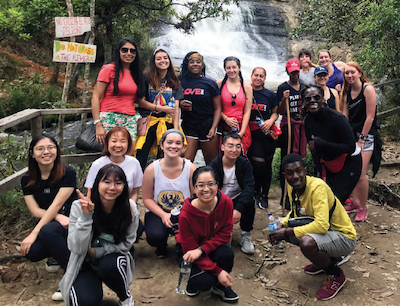When Jenny Willims first signed up for a study abroad experience in Colombia led by two School of Education faculty members, she admits be being both “excited and nervous” about the opportunity.
“You often hear about Colombia being referred to as the cocaine capital of the world and as this dangerous place,” said the sophomore from the Chicago suburbs who is majoring in special education. “But it ended up being this wonderful experience that opened my eyes to my own biases. If you’re looking to expand your mind and have an experience you’ll remember the rest of your life, I definitely recommend it.”

Led by Diana Rodríguez Gómez and Lesley Bartlett, “UW Conflict, Human Rights, and Education in Colombia” is a study abroad course that examines the history of the 70-year conflict in Colombia, including the United States’ role, and educational efforts oriented toward building peace and promoting human rights.
This past June, 16 UW–Madison students — 11 born in the U.S., three in China, one in South Korea, and one in Nigeria — traveled to South America for two weeks to learn from and engage with various education stakeholders, including international organizations, public officials, non-governmental organizations, educational administrators, teachers, and students. Being in Colombia, hearing from local researchers and students, and visiting community spaces helped the UW–Madison students deepen their understanding of the complex national, international, and global dimensions of human rights and education in Colombia.
The course partnered with Los Andes University, a world-class institution in Bogotá, Colombia’s capital and largest city, with nearly 10 million people in the metro area. Students lived in campus housing and met with Colombian faculty and students. “Even though it’s only a couple weeks, this course brings students together and builds such a strong community,” says Rebekah Pulido, a junior majoring in elementary education from Long Beach, California. “You can tell that your professors really care about you. They have so much passion and it’s not just them lecturing at you — it’s a back-and-forth conversation that is so useful.”
• • •
One area of focus for the School of Education’s new Global Engagement Office is developing it into a “first stop shop” for faculty members seeking to pull together a new study abroad program.
The goal is to find more and better ways to help students: expand their world view; cultivate intercultural understanding; become more competitive in the global workforce; and improve or develop language skills.
In addition to the Colombia experience, current study abroad programs led by School of Education faculty members include: Art Department Associate Professor Faisal Abdu’Allah’s trip to Cuba; Department of Curriculum and Instruction Professor Maggie Hawkins’ programs to Uganda and China; and a program to Austria that is co-led by Department of Kinesiology Faculty Associate Dan Timm.
Similarly, new study abroad options in the works include: Department of Curriculum and Instruction Associate Professor Li-Ching Ho’s program to China; David Bell and Luis Columna, both with the Department of Kinesiology, traveling to Australia and Costa Rica, respectively; and Andrea Ruppar, with the Department of Rehabilitation Psychology and Special Education, going to Finland.
“One part I really enjoy about these trips is spending so much time with the students, instead of the more typical three hours per week,” says Bartlett, a professor with the Department of Educational Policy Studies. “It’s a different kind of relationship and set- ting, which also allows the students to get to know each other and interact more deeply.”
• • •
When asked to name a highlight of the Colombian trip, there were a few mentions of hiking in the countryside, swimming in a waterfall, and touring Bogotá.
But even more of the students were noting the profound impact that the study abroad course had on how they thought about the world.
Several students, for example, explained that they learned about the transnational dimension of the “war on drugs” and how U.S. policies — such as the decision to fumigate coca crops — had devastating consequences for local farmers in rural Colombia.
“Going to Colombia gave me new perspectives and broke stereotypes I had about the country,” says Jisoo Kim, a senior Spanish and education studies major who was born in South Korea.
“This experience really got me thinking about what we are taught and what we learn via various media and whose perspectives are being told and whose are left out,” says Pulido.
“These are things I now think more critically about. As a future teacher, I want to bring some of what I’ve learned into the classroom. It’s shown me the importance of making sure all of my students’ voices are heard.”
Rodríguez Gómez, a native of Colombia who became an assistant professor with the Department of Educational Policy Studies in January 2019, adds that helping lead the study abroad course gave her a positive view of today’s students at UW–Madison.
“It gives you a great deal of hope when you witness young people thinking and learning and having deep conversations, where they are challenging how they think about the world,” says Rodríguez Gómez. “When I hear people complain, ‘Oh, the youth today,’ I say, ‘You don’t know what you’re talking about.’ These students are outstanding.”